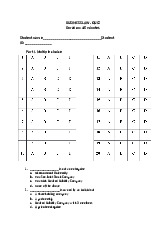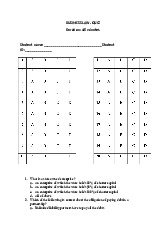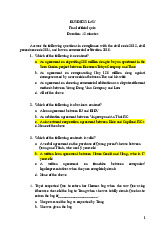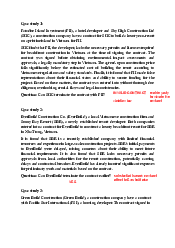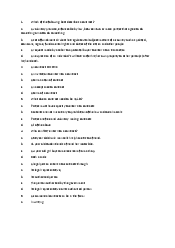




Preview text:
CHAP 5-6: FALLACIES I. Fallacies -
A (logical) fallacy is an argument that contains a mistake in reasoning -
Fallacies can be divided into 2 general types:
Fallacies of Relevance: Arguments in which the premises are logically irrelevant to the conclusion.
Fallacies of Insufficient Evidence: Arguments in which the premises,
though logically relevant to the conclusion, fail to provide sufficient evidence for the conclusion II. Fallacies of Relevance -
A statement is relevant to another statement if it provides at least some reason for
thinking that the second statement is true or false -
There are 3 ways in which a statement can be relevant or irrelevant to another:
A statement is positively relevant to another statement if it provides at
least some reasons for thinking that the second statement is true
Ex: Dogs are cats. Cats are felines. So dogs are felines
A statement is negatively relevant to another statement if it provides at
least some reason for thinking that the second statement is false
Ex: Marty is a high-school senior. So, Marty likely has a Ph.D
A statement is logically irrelevant to another statement if it provides no
reason for thinking that the second statement is either true or false.
Ex: The earth revolves around the sun. Therefore, marijuana should be legalized -
A fallacy of relevance occurs when an arguers offer reasons that are logically
irrelevant to his or her conclusion 1. Personal Attack -
When an arguer rejects a person’s argument or claim by attacking the person’s
character rather than examining the worth of the argument or claim itself. -
Pattern: X is a bad person. Therefore X’s argument must be bad -
The fallacy of personal attack occurs only if:
An arguer rejects another person’s argument or claim
The arguer attacks the person who offers the arguments or claim, rather
than considering the merits of that argument or claim -
Ex: “Bill says that we should give tax breaks to companies. But he is
untrustworthy, so it must be wrong to do that. 2. Attacking the Motive -
When an arguer criticizes a person’s motivation for offering a particular argument
or claim, rather than examining the worth of the argument or claim itself -
Pattern: X has biased or has questionable motives. Therefore, X’s arguments or claim should be rejected -
Ex: Prof. Michaelson has argued in favor of academic tenure. But why should we
even listen to Prof. Michaelson ? As a tenured professor, of course he support tenure
3. Look who’s talking (tu quoque) -
When an arguer rejects another person’s argument or claim because that person is a hypocrite -
Pattern: X fails to follow his or her advice. Therefore, X’s claim or argument should be rejected - Ex:
Doctor: You should quit smoking
Patient: Look who’s talking! I’ll quit when you do, Dr. Smokestack!
4. Two Wrongs make a Right -
When an arguer attempts to justify a wrongful act by claiming that some other act is just as bad or worse -
Pattern: Others are committing worse or equally bad acts. Therefore my wrongful act is justified -
Ex: “Why pick on me, officer? Everyone else is using drugs.” 5. Scare tactics -
When an arguer threatens harm to a reader or listener and this threat is irrelevant
to the truth of the arguer’s conclusion -
Remember: Fear is a powerful motivator – so powerful that it often causes us to think and behave irrationally -
Ex: “I’m sure you’ll agree that we are the rightful rulers of the Iraq. It would be
regrettable if we had to send armed forces to demonstrate the validity of our claim”
6. Appeal to Pity (tỏ ra đáng thương, đổ lỗi cho hoàn cảnh) -
When an arguer attempts to evoke feelings of pity or compassion, where such
feelings, however understandable, are not relevant to the truth of the arguer’s conclusion -
Pattern: P is presented, with the intent to create pity. Therefore claim is true -
Ex: I know I missed half your classes and failed to all my quizzes and
assignments. First my cat died. Then my gf told me she has found someone else.
With all I went through this semester, I don’t think I really deserve an F. Any
chance you might cut me some slack and change my grade to a C or a D ?
7. Bandwagon Argument ( peer pressure) -
When an arguer appeals to a person’s desire to be popular, accepted, or valued,
rather than to logically relevant reasons or evidence -
Pattern: Most people believe or do X. Therefore, you should believe or do X -
Ex: All the IU students use Iphone. Therefore, you should, too 8. Straw Man -
Substituting a person’s actual position or argument with a distorted exaggerated,
or misrepresented version of the position of the argument - Logical form: Person 1 makes claim Y
Person 2 restates person 1’s claim (in a distorted way)
Person 2 attacks the distorted version of the claim Therefore, claim Y is false
9. Red Herring (đánh lạc hướng) -
When an arguer tries to sidetrack his audience by raising an irrelevant issue, and
then claims that the original issue has been effectively settled by the irrelevant diversion -
Pattern: Topic A is under discussion. Topic B is introduced under the guise of
being relevant to topic A (when topic B is actually not relevant to topic A). Topic A is abandoned 10. Equivocation -
When an arguer uses a key word in an argument in 2 or more different senses -
Remember: Fallacies of equivocation can be difficult to spot. Because they often
appear valid, but they aren’t -
Ex: It is crime to smoke grass. Kentucky bluegrass is a grass. Therefore, it is a
crime to smoke Kentucky bluegrass. -
1 từ thường có nhiều nghĩa hiểu. Như ví dụ trên smoke grass là grass dạng cần,
thuốc phiện pla pla. Nhưng vế sau Kentucky bluegrass là 1 loại cây cỏ. Nên câu này mắc lỗi sai nghĩa
11. Begging the question -
When an arguer states or assumes as a premise (reason) the very thing he is
seeking to prove as a conclusion -
Also known as: assuming the initial point, assuming the answer, chicken and the
egg argument, circulus in probando, circular reasoning, vicious circle -
Reason: arguing in a circle – A because B, B because A -
Ex: Bungee – jumping is dangerous because it’s unsafe III.
Fallacies of Insufficient Evidence -
Arguments in which the premises, though logically relevant to the conclusion, fail
to provide sufficient evidence to support the conclusion.
1. Inappropriate appeal to Authority -
Citing a witness or authority that is untrustworthy
+ The source is not an authority on the subject at issue ?
Ex: My barber told me that Einstein’s general theory of relativity is a lot of
hogwash. I guess Einstein wasn’t as smart as everybody thinks he was
the arguer’s barber is not an authority on Einstein’s general
theory of relativity this argument commits the fallacy of
inappropriate appeal to authority.
=> appeal to a person who is not a genuine authority on the subject at issue.
+ The source is biased: we should be cautious about accepting a claim when
person making the claim is biased or has some other obvious motive to lie or mislead
+ The accuracy of the source’s observations is questionable
+ The source is known to be generally unreliable 2. Appeal to ignorance -
Claiming that sth is true because no one has proven it false or vice versa -
Remember: “Not proven, therefore false” => If such reasoning were allowed, we
could prove almost any conclusion -
Ex: No one has proven that global warning is occurring. Therefore, we must
conclude that it is not occurring 3. False alternatives -
Posing a false either/or choice -
Remember of false alternatives can involve more than 2 alternatives. It can also
be expressed as if-then statement -
Ex: Look, the choice is simple. Either you support a pure free market economy or
you support a communist police state.
4. Loaded question ( complex sentence) -
Posing a question that contains an unfair or unwarranted presupposition -
Tip: To respond to a loaded question effectively, one must distinguish the different
questions being asked and respond to each individually 5. Questionable cause -
Claiming, without sufficient evidence, that one thing is the cause of sth else -
Pattern: A and B are associated on a regular basis. Therefore A is the cause of B 6. Hasty generalization -
Drawing a general conclusion from a sample that is biased or too small. - Pattern:
A biased sample is one that is not representative of the target population
The target population is the group of people or things that the generalization is about
Hasty generalization can often lead to false stereotypes -
Ex: Do most Americans still believe in God? To find out, we asked more than ten
thousand scientists at colleges and universities throughout America. Less than 40
percent said that they believed in God. The conclusion is obvious: Most
Americans no longer believed in God 7. Slippery Slope -
Claiming, without sufficient evidence, that a seemingly harmless action, if taken,
will lead to a disastrous outcome. - Pattern:
The arguer claims that if a certain seemingly harmless action, A is
permitted. A will lead to B, B will lead to C, and so on to D.
The arguer holds that D is terrible thing and therefore A should not be permitted
In fact, there is no good reason to believe that A will actually lead to D 8. Weak analogy -
Comparing things that aren’t really comparable 9. Inconsistency -
Asserting inconsistent or contradictory claims -
